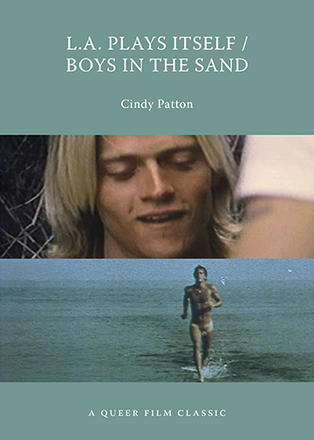
L.A. Plays Itself/Boys in the Sand
A Queer Film Classic
Description
A Queer Film Classic on two groundbreaking gay films from the early 1970s, both of which exemplify the growing liberalization of social attitudes toward sex and homosexuality in post-Stonewall America. L. A. Plays Itself and Boys in the Sand were both gay art house porn films released within months of each other at a theatre in New York in 1972. L. A. Plays Itself, directed by Fred Halsted, is a dark treatise on violence and urban squalor featuring hustlers and vagrants that reveals the City of Angels' dark side; Wakefield Poole's Boys in the Sand, meanwhile, is its sunny flipside, about a young man's sexual adventures at a gay beach resort community. Both films represent particular, polarizing moments in the early history of the gay movement.
Cindy Patton discusses the historical context of these films and their legal and social ramifications, as well as other films that were produced during this crucial period in cinematic history.
QUEER FILM CLASSICS is a critically acclaimed book series that launched in 2009, edited by Thomas Waugh and Matthew Hays, covering some of the most important and influential films about and/or by LBTQ people made between 1950 and 2005, and written by leading LGBTQ film scholars and critics.
Reviews
Cindy Patton dives into the queer archive to celebrate the sexual culture of the pre-AIDS 1970s gay world. Through her excavation, we're reminded that the periodicals and porn of that era represent powerful ideas that have not been erased by the requirements of equality. -Chris Bartlett, Executive Director, William Way LGBT Community Center (Philadelphia)
- Chris Bartlett
In an era when sexual imagery is a tap away by smartphone, Cindy Patton's book recaptures the turning point when Fred Halsted and Wakefield Poole ushered in a new form of gay erotic visibility. Influenced by gay liberation, while navigating through a tough social and legal context, Patton shows how these two iconic films paved the way for contemporary visions of how to be gay. -Barry D. Adam, University of Windsor
- Barry D. Adam
Imagine going back in time to gay New York or LA in the early 1970s when queers were really queer -- when sex involved a wider range of acts and roles, homosexuals understood that being an outlaw might also mean being free, cruising was exciting and risk more pleasurable? When porn was experimental, hot and just bizarre? We can't go back, but we get close when Cindy Patton, an expert guide to that period's sexual expression, offers a tour de force overview of the social, aesthetic, and erotic histories of the classics of gay porn films Boys in the Sand and L. A. Plays Itself. Patton does more than open our eyes to an important episode in gay film history, she revives a period alive to the inventiveness of sex and its representations, and she does so in an accessible, often witty and always insightful style that makes this a most enjoyable and fascinating read. -
- Christopher Castiglia
Christopher Castiglia, co-author of If Memory Serves: Gay Men, AIDS, and the Promise of the Queer Past
When a leading writer on the cultural politics of AIDS asks us to take gay male porn films of the 1970s on their own terms as radical visual and political experiments and not simply nostalgic pre-AIDS, pre-condoms sexual representations, we need to pay attention, especially when that writer is Cindy Patton. Her original analyses are revelatory and counterintuitive, rewriting the history of both sex and film.
- Constance Penley
-Constance Penley, co-editor of The Feminist Porn Book: The Politics of Producing Pleasure
Cindy Patton tells the story of 1970s gay pornography on its own terms, arguing that the tendency to look back on these works as an archive of condomless sex is to miss what is most interesting about them. Patton frames Boys in the Sand and L. A. Plays Itself as both aesthetic experiments and as communiques about changing sexual mores. She urges contemporary readers not to look back on the pre-AIDS era as a time when "sex was not risky" but rather as "that actual time when gay men defined for themselves what risk is and how it should be addressed. " A riveting account of gay sexual culture in the 70s from one of our foremost experts in the history of sexuality. -Heather Love, author of Feeling Backward: Loss and the Politics of Queer History
- Heather Love